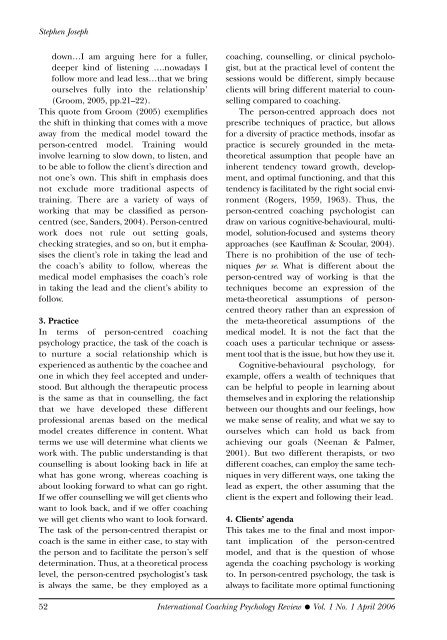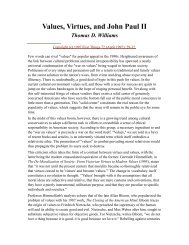Person-centred coaching psychology: A meta-theoretical perspective
Person-centred coaching psychology: A meta-theoretical perspective
Person-centred coaching psychology: A meta-theoretical perspective
You also want an ePaper? Increase the reach of your titles
YUMPU automatically turns print PDFs into web optimized ePapers that Google loves.
Stephen Josephdown…I am arguing here for a fuller,deeper kind of listening ….nowadays Ifollow more and lead less…that we bringourselves fully into the relationship’(Groom, 2005, pp.21–22).This quote from Groom (2005) exemplifiesthe shift in thinking that comes with a moveaway from the medical model toward theperson-<strong>centred</strong> model. Training wouldinvolve learning to slow down, to listen, andto be able to follow the client’s direction andnot one’s own. This shift in emphasis doesnot exclude more traditional aspects oftraining. There are a variety of ways ofworking that may be classified as person<strong>centred</strong>(see, Sanders, 2004). <strong>Person</strong>-<strong>centred</strong>work does not rule out setting goals,checking strategies, and so on, but it emphasisesthe client’s role in taking the lead andthe coach’s ability to follow, whereas themedical model emphasises the coach’s rolein taking the lead and the client’s ability tofollow.3. PracticeIn terms of person-<strong>centred</strong> <strong>coaching</strong><strong>psychology</strong> practice, the task of the coach isto nurture a social relationship which isexperienced as authentic by the coachee andone in which they feel accepted and understood.But although the therapeutic processis the same as that in counselling, the factthat we have developed these differentprofessional arenas based on the medicalmodel creates difference in content. Whatterms we use will determine what clients wework with. The public understanding is thatcounselling is about looking back in life atwhat has gone wrong, whereas <strong>coaching</strong> isabout looking forward to what can go right.If we offer counselling we will get clients whowant to look back, and if we offer <strong>coaching</strong>we will get clients who want to look forward.The task of the person-<strong>centred</strong> therapist orcoach is the same in either case, to stay withthe person and to facilitate the person’s selfdetermination. Thus, at a <strong>theoretical</strong> processlevel, the person-<strong>centred</strong> psychologist’s taskis always the same, be they employed as a<strong>coaching</strong>, counselling, or clinical psychologist,but at the practical level of content thesessions would be different, simply becauseclients will bring different material to counsellingcompared to <strong>coaching</strong>.The person-<strong>centred</strong> approach does notprescribe techniques of practice, but allowsfor a diversity of practice methods, insofar aspractice is securely grounded in the <strong>meta</strong><strong>theoretical</strong>assumption that people have aninherent tendency toward growth, development,and optimal functioning, and that thistendency is facilitated by the right social environment(Rogers, 1959, 1963). Thus, theperson-<strong>centred</strong> <strong>coaching</strong> psychologist candraw on various cognitive-behavioural, multimodel,solution-focused and systems theoryapproaches (see Kauffman & Scoular, 2004).There is no prohibition of the use of techniquesper se. What is different about theperson-<strong>centred</strong> way of working is that thetechniques become an expression of the<strong>meta</strong>-<strong>theoretical</strong> assumptions of person<strong>centred</strong>theory rather than an expression ofthe <strong>meta</strong>-<strong>theoretical</strong> assumptions of themedical model. It is not the fact that thecoach uses a particular technique or assessmenttool that is the issue, but how they use it.Cognitive-behavioural <strong>psychology</strong>, forexample, offers a wealth of techniques thatcan be helpful to people in learning aboutthemselves and in exploring the relationshipbetween our thoughts and our feelings, howwe make sense of reality, and what we say toourselves which can hold us back fromachieving our goals (Neenan & Palmer,2001). But two different therapists, or twodifferent coaches, can employ the same techniquesin very different ways, one taking thelead as expert, the other assuming that theclient is the expert and following their lead.4. Clients’ agendaThis takes me to the final and most importantimplication of the person-<strong>centred</strong>model, and that is the question of whoseagenda the <strong>coaching</strong> <strong>psychology</strong> is workingto. In person-<strong>centred</strong> <strong>psychology</strong>, the task isalways to facilitate more optimal functioning52 International Coaching Psychology Review ● Vol. 1 No. 1 April 2006



